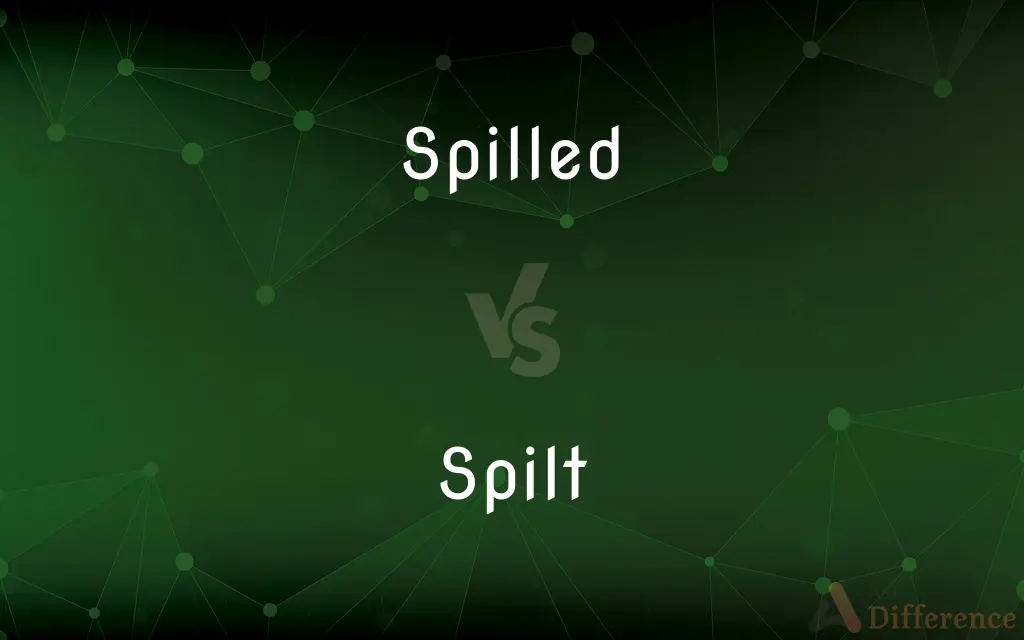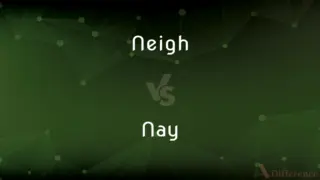Spilled vs. Spilt — What's the Difference?
By Tayyaba Rehman — Updated on October 3, 2023
"Spilled" and "Spilt" both refer to the past tense of spill, meaning to cause or allow liquid to flow over the edge of its container, primarily differing in their usage: "Spilled" is common in American English, while "Spilt" is used in British English.

Difference Between Spilled and Spilt
Table of Contents
ADVERTISEMENT
Key Differences
Spilled" is widely recognized and employed in American English to denote the past and past participle form of the verb "spill," implicating an unintentional flow of liquid out of its container. When conversing or writing in American English contexts, "spilled" is ubiquitously accepted and understood, symbolizing an inadvertent discharge of liquid. On the other hand, "Spilt" is largely acknowledged in British English as the past and past participle form of "spill," reflecting a similar unintentional liquid discharge but adhering to British linguistic norms.
In American English, "Spilled" is used extensively in various contexts, from daily conversations to formal writings, to describe an accidental loss of liquid. The acceptability and usage of "Spilled" in American English ensure its prominence in written and verbal communication, symbolizing an unintentional release of fluid. In contrast, British English predominantly utilizes "Spilt," whether in informal dialogues or formal discourses, as a customary linguistic choice to describe accidentally released liquid, adhering to its own conventional linguistic practices.
"Spilled" and "Spilt" showcase a fascinating aspect of the variances observed between American and British English. "Spilled" in American conversations or narratives seamlessly integrates, providing a universally comprehensible expression regarding unintended liquid displacement. Conversely, "Spilt" integrates equivalently into British communicative contexts, offering a linguistically and culturally appropriate expression, synonymous in meaning but differing in regional linguistic preference.
When it comes to utilizing these terms in international or cross-cultural communication, understanding the preference for "Spilled" in American English and "Spilt" in British English ensures coherent and culturally considerate interaction. “Spilled” thus often appears in American publications, media, and dialogues, reflecting its ingrained presence in American linguistic culture. Simultaneously, “Spilt” finds its place in British publications and conversations, mirroring its embeddedness in British linguistic culture.
In the realms of global English communication, where American and British English often intersect, recognizing the acceptance of "Spilled" in Americanized contexts and "Spilt" in British contexts aids in nurturing linguistically sensitive and intelligible communication. This awareness allows for communicative flexibility, whereby "Spilled" might be chosen for American audiences and "Spilt" for British counterparts, respecting and acknowledging the linguistic nuances of each variant of English.
ADVERTISEMENT
Comparison Chart
Geographical Preference
Predominantly used in American English.
Chiefly used in British English.
Linguistic Context
Utilized in both informal and formal contexts in American English.
Employed in both casual and formal British English contexts.
Global English Communication
Understood but may be viewed as an Americanism in international contexts.
Understood but may be viewed as a Britishism in international dialogues.
Publications and Media
Commonly appears in American publications and media.
Predominantly appears in British publications and media.
Multicultural Interaction
"Spilled" might be chosen for communication adhering to American English norms.
"Spilt" might be selected for dialogue adhering to British English standards.
Compare with Definitions
Spilled
Released contents unintentionally.
She spilled the beans about the surprise party.
Spilt
Unintentionally caused a liquid to overflow.
Tea was spilt on the tablecloth.
Spilled
Lost control of contents.
The tanker spilled oil into the ocean.
Spilt
Allowed something to disseminate accidentally.
The bag of sugar spilt all over the kitchen floor.
Spilled
Caused liquid to accidentally flow out.
He spilled the milk while pouring.
Spilt
Allowed to escape from containment.
Chemicals were spilt during the experiment.
Spilled
Resulted in dispersal of items.
The box spilled its contents across the floor.
Spilt
Released contents by accident.
The information was spilt to the media.
Spilled
To cause or allow (a substance) to run or fall out of a container.
Spilt
Created a mess by unintentional overflow.
Soup was spilt during the hurried lunch.
Spilled
To scatter (objects) from containment
Spilled the armload of books on the desk.
Spilt
A past tense and a past participle of spill1.
Spilled
To shed (blood).
Spilt
That has been spilled.
Don't cry over spilt milk; tears won't put it back in the glass.
Spilled
To relieve the pressure of wind on (a sail).
Spilt
Simple past tense and past participle of spill
Spilled
To cause or allow (wind) to be lost from a sail.
Spilled
To cause to fall
The rider was spilled by his horse.
Spilled
(Informal) To disclose (something previously unknown); divulge
The witness spilled all the details about the suspect.
Spilled
To run or fall out of a container or containment.
Spilled
To come to the ground suddenly and involuntarily.
Spilled
To pour out or spread beyond limits
Fans spilled onto the playing field.
Spilled
The act of spilling.
Spilled
An amount spilled.
Spilled
A fall, as from a horse.
Spilled
A spillway.
Spilled
Simple past tense and past participle of spill
Spilled
Made secret information public.
The agent never spilled the secrets.
Common Curiosities
Can "Spilled" be used in British English?
While "Spilt" is more common, "Spilled" can be used and understood in British English but may be seen as an American usage.
Is "Spilt" accepted in academic and formal writing in the UK?
Yes, "Spilt" is accepted and commonly used in both informal and formal contexts in British English.
Is "Spilt" considered incorrect in American English?
"Spilt" is understood in American English but "Spilled" is conventionally used and preferred.
Is there a difference in meaning between "Spilled" and "Spilt"?
No, "Spilled" and "Spilt" have the same meaning but differ in regional usage ("Spilled" in American English and "Spilt" in British English).
Can "Spilled" be used to refer to things other than liquids?
Yes, "Spilled" can metaphorically refer to letting something, like information, become known unintentionally.
Share Your Discovery

Previous Comparison
Blanky vs. Blanket
Next Comparison
Neigh vs. NayAuthor Spotlight
Written by
Tayyaba RehmanTayyaba Rehman is a distinguished writer, currently serving as a primary contributor to askdifference.com. As a researcher in semantics and etymology, Tayyaba's passion for the complexity of languages and their distinctions has found a perfect home on the platform. Tayyaba delves into the intricacies of language, distinguishing between commonly confused words and phrases, thereby providing clarity for readers worldwide.
















































